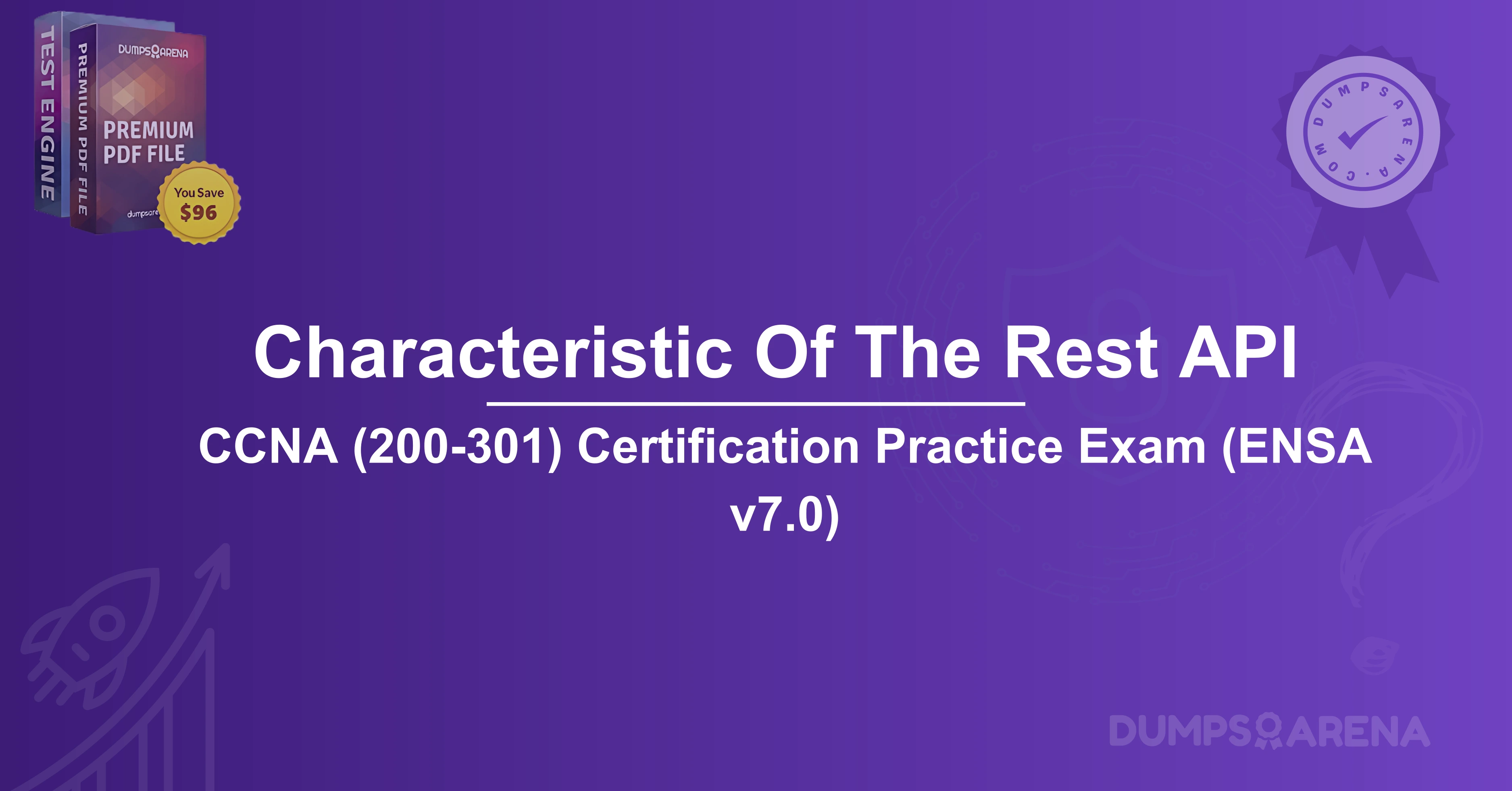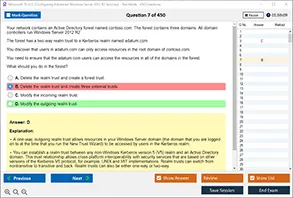Introduction
In the modern era of technology, Application Programming Interfaces (APIs) have become the backbone of software development and integration. Among the various types of APIs, REST (Representational State Transfer) API has emerged as one of the most popular and widely used architectures. REST APIs are known for their simplicity, scalability, and flexibility, making them a preferred choice for developers and organizations alike. This article delves into the characteristics of REST API, its role in the Cisco 200-301 CCNA certification, and how platforms like DumpsArena can aid in mastering these concepts.
What is a REST API?
REST, or Representational State Transfer, is an architectural style for designing networked applications. It relies on a stateless, client-server, cacheable communications protocol -- the HTTP protocol is almost always used. REST APIs are used to interact with web services, allowing different software systems to communicate with each other over the internet.
Key Characteristics of REST API
- Statelessness: One of the fundamental characteristics of REST API is that it is stateless. This means that each request from a client to a server must contain all the information needed to understand and process the request. The server does not store any client context between requests, which simplifies the server design and improves scalability.
- Client-Server Architecture: REST APIs follow a client-server architecture, where the client and server are separate entities that communicate over a network. This separation allows for the independent evolution of the client and server, enabling developers to make changes to one without affecting the other.
- Uniform Interface: REST APIs have a uniform interface that simplifies the architecture and improves visibility. This is achieved through the use of standard HTTP methods (GET, POST, PUT, DELETE) and resource identifiers (URIs). The uniform interface ensures that the API is easy to understand and use.
- Cacheability: REST APIs are designed to be cacheable, which means that responses from the server can be cached by the client. This reduces the number of requests to the server, improving performance and scalability. Cacheability is achieved through the use of HTTP headers that control caching behavior.
- Layered System: REST APIs can be designed as a layered system, where each layer has a specific role and interacts with other layers in a hierarchical manner. This allows for the separation of concerns and improves the scalability and flexibility of the system.
- Code on Demand (Optional): Although not a mandatory characteristic, REST APIs can optionally support code on demand. This means that the server can send executable code to the client, which can be executed within the client's environment. This feature is rarely used but can be useful in certain scenarios.
Role of REST API in Cisco 200-301 CCNA Certification
The Cisco Certified Network Associate (CCNA) 200-301 certification is a foundational-level certification that validates a candidate's knowledge and skills in networking fundamentals, IP connectivity, network access, security fundamentals, and automation and programmability. REST APIs play a significant role in the automation and programmability section of the CCNA certification.
Automation and Programmability in CCNA 200-301
With the increasing complexity of modern networks, automation and programmability have become essential skills for network engineers. The CCNA 200-301 certification emphasizes the importance of these skills by including topics related to network automation, APIs, and programmability.
REST APIs in Network Automation
REST APIs are widely used in network automation to interact with network devices, retrieve information, and configure settings. Network devices such as routers, switches, and firewalls often provide REST APIs that allow network engineers to programmatically manage and monitor the network.
For example, a network engineer can use a REST API to retrieve the status of a network device, configure VLANs, or monitor network traffic. By leveraging REST APIs, network engineers can automate repetitive tasks, reduce human errors, and improve the efficiency of network operations.
REST APIs and Cisco Devices
Cisco, being a leading provider of networking equipment, has embraced the use of REST APIs in its devices. Many Cisco devices, such as the Cisco DNA Center, Cisco Meraki, and Cisco IOS XE, provide REST APIs that allow network engineers to programmatically interact with the devices.
In the context of the CCNA 200-301 certification, candidates are expected to understand how to use REST APIs to interact with Cisco devices. This includes understanding the basics of REST API, how to make HTTP requests, and how to interpret the responses.
Importance of REST API Knowledge in CCNA 200-301
Having a solid understanding of REST APIs is crucial for success in the CCNA 200-301 certification. The certification exam includes questions related to network automation and programmability, and candidates are expected to demonstrate their ability to use REST APIs to interact with network devices.
Moreover, as networks continue to evolve, the demand for network engineers with automation and programmability skills is expected to grow. By mastering REST APIs, CCNA candidates can position themselves as valuable assets in the job market and enhance their career prospects.
The Advantage of DumpsArena in Mastering REST API and CCNA 200-301
Preparing for the CCNA 200-301 certification can be challenging, especially when it comes to understanding complex topics like REST APIs. This is where platforms like DumpsArena come into play. DumpsArena is a leading online platform that provides high-quality study materials, practice exams, and dumps for various IT certifications, including the CCNA 200-301.
How DumpsArena Can Help?
- Comprehensive Study Materials: DumpsArena offers a wide range of study materials that cover all the topics included in the CCNA 200-301 certification exam. This includes detailed explanations of REST APIs, network automation, and programmability. The study materials are designed to help candidates understand the concepts thoroughly and apply them in real-world scenarios.
- Practice Exams: One of the best ways to prepare for the CCNA 200-301 certification exam is by taking practice exams. DumpsArena provides a large number of practice exams that simulate the actual exam environment. These practice exams include questions related to REST APIs, allowing candidates to test their knowledge and identify areas where they need improvement.
- Real Exam Dumps: DumpsArena also offers real exam dumps that contain questions and answers from previous CCNA 200-301 certification exams. These dumps are an excellent resource for candidates who want to familiarize themselves with the types of questions that may appear on the exam. By studying these dumps, candidates can gain confidence and improve their chances of passing the exam.
- Expert Guidance: DumpsArena has a team of experienced IT professionals who provide expert guidance and support to candidates. Whether you have questions about REST APIs or need help with other topics, the DumpsArena team is always available to assist you.
- Flexible Learning: DumpsArena offers flexible learning options that allow candidates to study at their own pace. Whether you prefer to study online or offline, DumpsArena has the resources you need to succeed.
Why Choose DumpsArena?
- High-Quality Content: DumpsArena is known for providing high-quality study materials and practice exams that are regularly updated to reflect the latest exam trends and topics.
- Affordable Pricing: DumpsArena offers affordable pricing options, making it accessible to a wide range of candidates.
- Positive Reviews: DumpsArena has received positive reviews from thousands of satisfied customers who have successfully passed their certification exams using DumpsArena's resources.
- Money-Back Guarantee: DumpsArena offers a money-back guarantee to candidates who are not satisfied with their purchase. This demonstrates the platform's commitment to customer satisfaction.
Conclusion
REST APIs are a fundamental aspect of modern networking and play a crucial role in the automation and programmability of network devices. Understanding REST APIs is essential for success in the Cisco 200-301 CCNA certification, as it is a key topic in the exam. By mastering REST APIs, candidates can enhance their networking skills, improve their career prospects, and contribute to the efficient management of modern networks.
Platforms like DumpsArena provide valuable resources that can help candidates prepare for the Cisco certification exam. With comprehensive study materials, practice exams, real exam dumps, and expert guidance, DumpsArena is an excellent choice for candidates who want to achieve their certification goals.
In conclusion, REST APIs are a critical component of modern networking, and their importance is reflected in the CCNA 200-301 certification. By leveraging the resources provided by DumpsArena, candidates can gain a deep understanding of REST APIs and other key topics, ensuring their success in the certification exam and beyond.
Get Accurate & Authentic 500+ CCNA 200-301 Exam Questions
1. Which of the following is a key characteristic of REST API?
A. Stateful communication
B. Tightly coupled components
C. Stateless communication
D. Requires SOAP protocol
2. REST APIs typically use which protocol for communication?
A. FTP
B. HTTP/HTTPS
C. SMTP
D. TCP/IP
3. What does REST stand for in REST API?
A. Representational State Transfer
B. Remote State Transfer
C. Representational Server Transfer
D. Remote Server Transfer
4. Which HTTP method is commonly used in REST APIs to retrieve data?
A. POST
B. PUT
C. GET
D. DELETE
5. Which of the following is NOT a characteristic of REST API?
A. Stateless
B. Cacheable
C. Requires sessions
D. Uniform interface
6. What is the purpose of the "Uniform Interface" constraint in REST APIs?
A. To ensure all requests are processed in the same order
B. To standardize the way clients interact with resources
C. To enforce stateful communication
D. To limit the number of requests a client can make
7. Which of the following is an example of a REST API response format?
A. XML
B. JSON
C. CSV
D. Both A and B
8. What is the role of HTTP status codes in REST APIs?
A. To indicate the success or failure of a request
B. To encrypt the response data
C. To define the structure of the request body
D. To limit the number of API calls
9. Which HTTP method is used to update an existing resource in a REST API?
A. POST
B. PUT
C. PATCH
D. Both B and C
10. What is the significance of "statelessness" in REST APIs?
A. The server stores client session data between requests
B. Each request from the client contains all the information needed to process it
C. The client must maintain a constant connection to the server
D. The server handles all state management for the client



